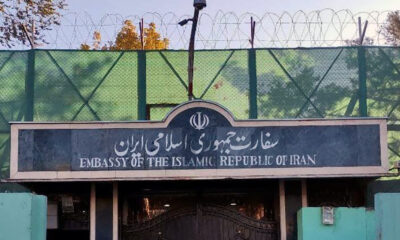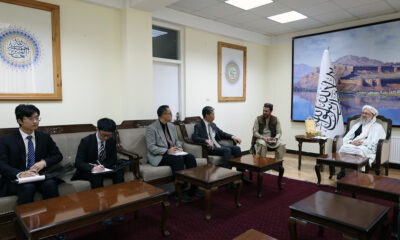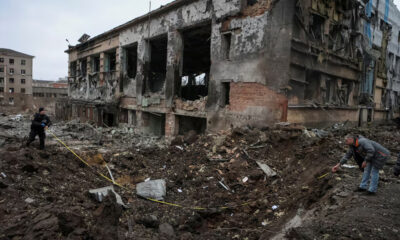Regional
Who are Yemen’s Houthis and why are they attacking Red Sea ships?
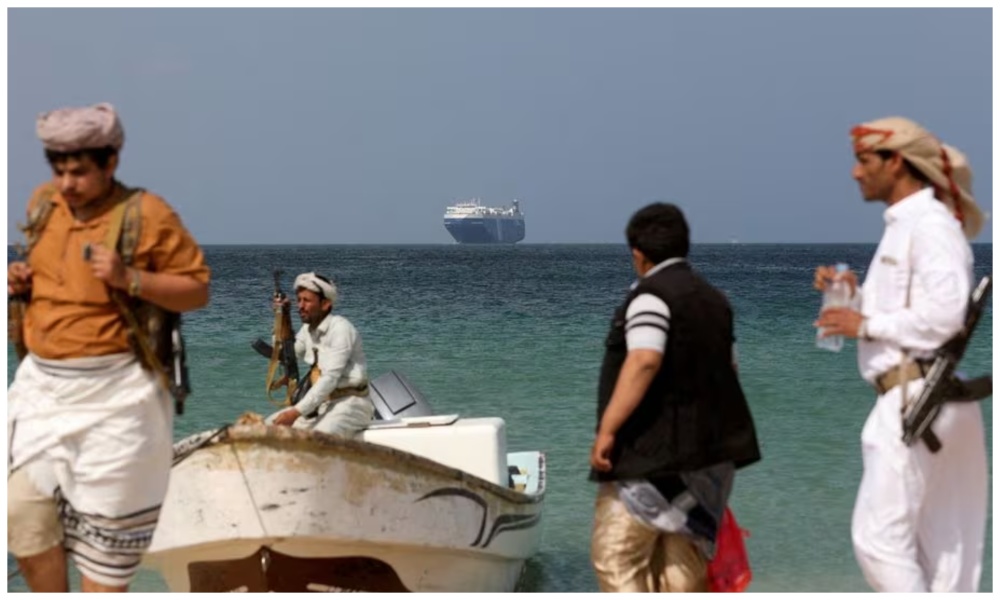
The Iran-aligned Houthis of Yemen are playing an escalating role in the Middle East, attacking shipping in the Red Sea and firing drones and missiles at Israel in a campaign they say aims to support Palestinians in the Gaza war, Reuters reported.
U.S. Defense Secretary Lloyd Austin on Tuesday announced the creation of a multinational operation to safeguard commerce in the Red Sea in response to the Houthi attacks.
The Houthis’ role has added to the conflict’s regional risks, threatening sea lanes through which much of the world’s oil is shipped, and worrying states on the Red Sea as Houthi rockets and drones fly towards Israel.
Who are the Houthis?
History
In the late 1990s, the Houthi family in far north Yemen set up a religious revival movement for the Zaydi sect of Shi’ite Islam, which had once ruled Yemen but whose northern heartland had became impoverished and marginalised, Reuters reported.
As friction with the government grew, they fought a series of guerrilla wars with the national army and a brief border conflict with Sunni powerhouse Saudi Arabia.
Growing Power
Their power grew during the Yemen war which began in late 2014, when they seized Sanaa. Worried by the growing influence of Shi’ite Iran along its border, Saudi Arabia intervened at the head of a Western-backed coalition in 2015 in support of the Yemeni government, Reuters reported.
The Houthis established control over much of the north and other big population centres, while the internationally recognised government based itself in Aden.
Yemen has enjoyed more than a year of relative calm amid a U.N.-led peace push. Saudi Arabia has been holding talks with the Houthis in a bid to exit the war.
Role in Middle East war
The Houthis waded into the latest conflict as it spread around the Middle East, announcing on Oct. 31 they had fired drones and missiles at Israel and vowing they would continue to mount attacks “until the Israeli aggression stops”.
Their actions have echoed the role of the Iran-backed Lebanese group Hezbollah, which has been attacking Israeli positions at the Lebanese frontier, and Iraqi militias which have been firing at U.S. interests in Iraq and Syria.
Stepping up their threats, the Houthis said on Dec. 9 they would target all ships heading to Israel, regardless of nationality, and warned all international shipping companies against dealing with Israeli ports, Reuters reported.
“If Gaza does not receive the food and medicine it needs, all ships in the Red Sea bound for Israeli ports, regardless of their nationality, will become a target for our armed forces,” the Houthi spokesperson said in a Dec. 9 statement.
The Houthis’ slogan is “Death to America, Death to Israel, curse the Jews and victory to Islam”.
Iran links
The United States believes that Iran’s Islamic Revolutionary Guard Corps is helping to plan and carry out the Houthi missile and drone attacks, Reuters reported.
“Iran’s support for Houthi attacks on commercial vessels must stop,” U.S. Defense Secretary Lloyd Austin said on Dec. 18.
Iran denies involvement.
The Saudi-led coalition has long accused Iran of arming, training and funding the Houthis. The Houthis deny being an Iranian proxy and say they develop their own weapons.
Arsenal
The Houthis demonstrated their missile and drone capabilities during the Yemen war in attacks on Saudi Arabia and the United Arab Emirates, targeting oil installations and vital infrastructure.
The arsenal includes ballistic missiles and armed drones capable of hitting Israel more than 1,000 miles from their seat of power in Sanaa.
Its Tofan, Borkan, and Quds missiles are modeled on Iranian weapons and can hit targets up to 2,000 km away, experts say.
The Houthis fired these missiles at Saudi Arabia dozens of times during the Yemen war. In September, the Houthis displayed anti-aircraft Barq-2 missiles, naval missiles, a Mig-29 fighter jet and helicopters for the first time.
The Houthis have also used fast boats armed with machine guns in their operations against shipping.
Regional
Reported Indian role in assassination plots a ‘serious matter’, White House says
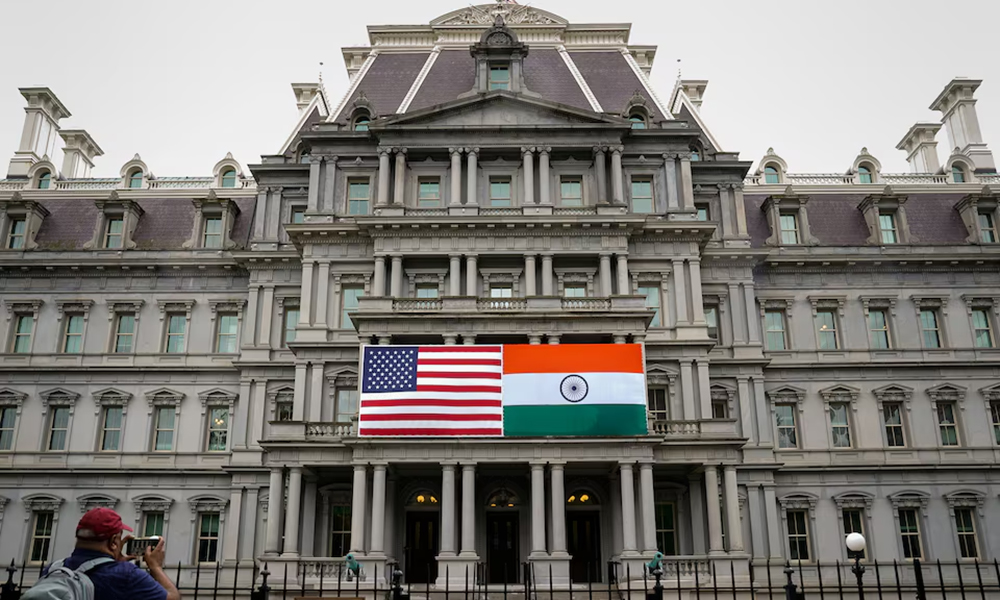
The White House said on Monday it viewed the reported role of the Indian intelligence service in two assassination plots in Canada and the United States as a serious matter.
The Washington Post reported that an officer in India’s intelligence service was directly involved in a foiled plan to assassinate a U.S. citizen who is one of Indian Prime Minister Narendra Modi’s most vocal critics in the United States.
It said the officer was also involved in the separate shooting death of a Sikh activist last June in Canada.
India’s foreign ministry said the Washington Post report made “unwarranted and unsubstantiated imputations on a serious matter” while New Delhi is investigating the issue.
“Speculative and irresponsible comments on it are not helpful,” foreign ministry spokesperson Randhir Jaiswal said in a statement.
“This is a serious matter, and we’re taking that very, very seriously,” White House spokesperson Karine Jean-Pierre told reporters.
“We’re going to continue to raise our concerns.”
In November, U.S. authorities said an Indian government official had directed the plot in the attempted murder of Gurpatwant Singh Pannun, a Sikh separatist and dual citizen of the United States and Canada, Reuters reported.
India has expressed concern about the linkage and dissociated itself from the plot, saying it would formally investigate the concerns of the United States, and take ‘necessary follow-up action’ on the findings of a panel set up on Nov. 18.
Pannun is the general counsel of Sikhs for Justice, a group that India labeled an “unlawful association” in 2019, citing its involvement in extremist activities. Subsequently, in 2020, India listed Pannun as an “individual terrorist”.
The issue is a delicate one for both India and the Biden administration in the United States as they try to build closer ties in the face of shared concerns about China’s growing power.
News of the U.S. plot came two months after Canada said it was looking at credible allegations potentially linking Indian agents to the June murder of Hardeep Singh Nijjar, another Sikh separatist, in a Vancouver suburb.
India strongly rejected Ottawa’s accusations.
Regional
Dubai ruler approves new $35 billion airport terminal

Dubai’s ruler Sheikh Mohammed bin Rashid al-Maktoum approved a new passenger terminal in Al Maktoum International airport worth 128 billion AED ($34.85 billion), he said on Sunday in a post on X.
The Al Maktoum International Airport will be the largest in the world with a capacity of up to 260 million passengers, and five times the size of Dubai International Airport, he added, saying that all operations at Dubai airport would be transferred to Al Maktoum in the coming years, Reuters reported.
The Al Maktoum airport will also include 400 terminal gates and five runways, he said.
The airport will be the new home of flagship carrier Emirates and its sister low-cost airline Flydubai along with all airline partners connecting the world to and from Dubai, Dubai state-owned airline Emirates chairman Sheikh Ahmed bin Saeed al-Maktoum said.
The move “further solidifies Dubai’s position as a leading aviation hub on the world stage”, the CEO of Dubai Airports, Paul Griffiths, was quoted as saying by the Dubai Media Office.
Regional
Iraq criminalises same-sex relationships with maximum 15 years in prison

Iraq’s parliament passed a law criminalising same-sex relationships with a maximum 15-year prison sentence on Saturday, in a move it said aimed to uphold religious values but was condemned by rights advocates as the latest attack on the LGBT community in Iraq.
The law aims to “protect Iraqi society from moral depravity and the calls for homosexuality that have overtaken the world,” Reuters reported citing a copy of the law.
It was backed mainly by conservative Shi’ite Muslim parties who form the largest coalition in mainly Muslim Iraq’s parliament.
The Law on Combating Prostitution and Homosexuality bans same-sex relations with at least 10 years and a maximum of 15 years in prison, and mandates at least seven years in prison for anybody who promotes homosexuality or prostitution.
It also imposes between one and three years in prison for anyone who changes their “biological gender” or wilfully dresses in an effeminate manner.
The bill had initially included the death penalty for same-sex acts but was amended before being passed after strong opposition from the United States and European nations.
Until Saturday, Iraq didn’t explicitly criminalise gay sex, though loosely defined morality clauses in its penal code had been used to target LGBT people, and members of the community have also been killed by armed groups and individuals.
“The Iraqi parliament’s passage of the anti-LGBT law rubber-stamps Iraq’s appalling record of rights violations against LGBT people and is a serious blow to fundamental human rights,” Rasha Younes, deputy director of the LGBT rights programme at Human Rights Watch, told Reuters.
Iraqi officials who oversee human rights could not immediately be reached for comment.
Major Iraqi parties have in the past year stepped up criticism of LGBT rights, with rainbow flags frequently being burned in protests by both ruling and opposition conservative Shi’ite Muslim factions last year.
More than 60 countries criminalise gay sex, while same-sex sexual acts are legal in more than 130 countries, according to Our World in Data.
-

 Sport4 days ago
Sport4 days agoAfghanistan beat Iraq 5-3, inch closer to Futsal World Cup berth
-

 Regional4 days ago
Regional4 days agoNew UK sanctions target Iranian drone industry
-

 Latest News4 days ago
Latest News4 days agoEU allocates 17 million euros to support Afghans on the move
-

 Latest News3 days ago
Latest News3 days agoPakistan extends registered Afghan refugees’ stay till June 30
-

 World5 days ago
World5 days agoUS student protests over Gaza intensify despite arrests
-

 Regional3 days ago
Regional3 days agoChina to host Hamas, Fatah for Palestinian unity talks
-

 Sport2 days ago
Sport2 days agoAfghanistan qualify for FIFA Futsal World Cup for first time ever
-

 Latest News4 days ago
Latest News4 days agoTripartite trade meeting held in Kabul to boost regional connectivity








